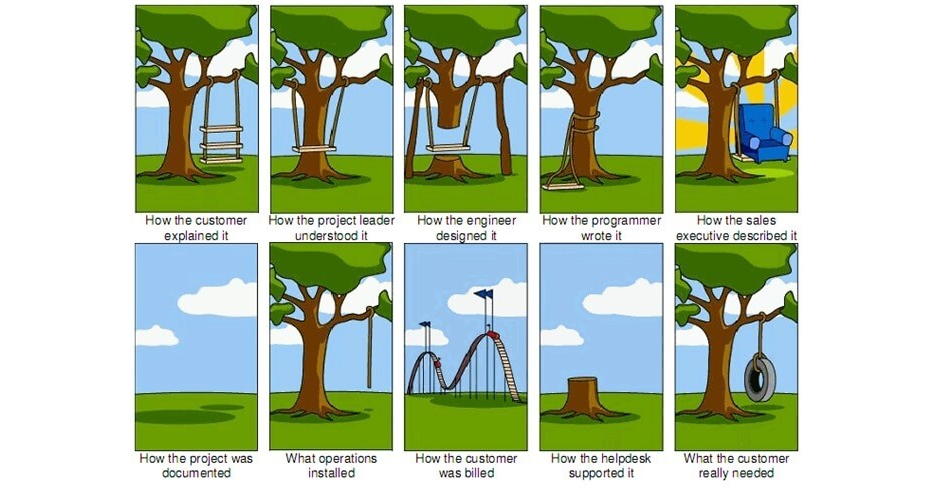Table of Contents
Project development is a live complex process that needs involvement not only of a development team but a client as well. In order to deliver a good product, all parties should work as a single mechanism: dev team, management team and client. Though, the technical part is the core of the project functionality, even if you have the strongest dev team in the world, it doesn’t mean the project will succeed. Sometimes a client’s actions may cause a project failure. Let’s talk about the most common mistakes that may affect project delivery.
1. I Don’t Want to Read Project Specifications
The first stage of the project is understanding the list of features it should have to achieve its business goal and how they will work, i.e. project specifications.
This stage is very important because these specifications will be used by the dev team to create the final product. Here in Altamira we have a team of Business Analysts who works closely with clients to gather all their needs and transform them into project requirements. If you want to receive a project that meets your expectations, you should pay much attention to this stage as it is a project base. It’s like building a house without paying attention to its groundwork. Moreover, you are the best expert in your business who can advise on features to resolve its needs.
In case you won’t understand your project specifications it may lead to:
- You don’t know how one or another feature works
- You don’t understand you project possibilities and limitations
- The project doesn’t solve all your business needs
- The project doesn’t meet your expectations at all
2. I Don’t Know Exactly What I Want so I Often Change My Requirements
This may happen when you have an idea of the project but don’t have the exact list of problems it should resolve. Market research can help you here. If you find competitors, you will understand the problems they resolve with their projects and decide what you can offer extra to get the users.
Another way is to divide a project into small parts and release them one after another. This will help you to receive feedback from the users in the early stages and prioritize the features for development based on this information.
If you don’t understand the exact list of features for development and often change your requirements it may lead to:
- Project budget and timeline will increase
- You may face with project limitations or with the need to rewrite it from scratch
- Permanent changes affect project stability from technical side
- After release user may not need a half of features your project provides
3. I Have too Many Features to Include Into First Release
While you discuss the 101st feature with your dev team, your competitors already released their projects and received your users. Partially, this is the same case as the one above. You don’t know if all the features you want to have will be required by your users. However, you will spend time and money developing them.
The best way here is to define the core functionality (MVP – Minimum viable product) and release it first. This way you will have your users and their feedback at once that will help you to decide which features they need.
In case you delay project first release this may lead to:
- Your competitors will release similar project earlier
- The problem your project should solve became outdated
- You project became overloaded with functionality that is not required
4. I Don’t Want Intermediate Demo Meetings / Project Builds
Demo meetings, i.e. demonstration of ready functionality is needed to:
- Track project progress
- Make small corrections
- Prioritize future works
- Make sure the requirements are met
In Altamira we use scrum framework for project development, so we always have demo meetings once per sprint. This helps us to maintain transparency with our clients and regularly provide them with the latest update. Also we provide our clients with intermediate builds to check by themselves. This helps to better understand how the system works and whether it’s usable.
In case you don’t have such intermediate checks it may lead to:
- You don’t understand project progress;
- You will miss the moment when you can add some corrections;
- You don’t know how one or another feature works;
- You don’t understand your project possibilities and limitations;
- Final project may not meet your expectations.
5. I Want to Decrease Project Budget/Timeline by Sacrificing Testing Stage
There are different types of testing on the project. We won’t describe all of them here, we’ll just mention that two main groups are automatic and manual testing. These types of testing complement each other and in no case interchange.
Every time you sacrifice a part of the testing stage you make your project less stable. This may cause the situation when there are critical bugs on production. You will be stressed, your dev team will be stressed and your users will complain or even stop using your services. In most cases this is the worst decision you can make.
6. I Don’t Need a Project Manager. This Role is Useless
If you think that your project doesn’t need a Project Manager, you are so wrong. First of all almost every project requires a lot of communication: internal and external. Dev team can’t organize it by themselves, because they won’t have time for their work then. There should be one responsible person who can organize all processes. Here is a short list of what the manager usually does on the project:
- Planning work within project budget and timeline
- Managing project resources
- Organizing all project meetings (internal and external)
- Working with dev team motivation
- Reporting on project progress
This is not the full list, but the most important part of it. So we can say that you need a Project Manager to organize dev team work, maintain all communication and remove all blocks for the dev team so they can complete their work in time and within your budget.
FAQ
7. I Don’t Want to Make Any Decisions, You Are The Expert, Do It Right
You are completely right in saying that the development company you work with is an expert and should know how to transform your idea into a product. The most important part is that the development company has an expertise in development. And you are an expert in your business. Thus, your impact is very important to deliver the project that will meet your goal and bring value to your business.
When you build a house, you hire a company who has an expertise in this. However. You make a final decision on how many rooms you need, what colours you want and what type of materials to buy. The same as in development. We can offer you the best solutions but the final decision maker is you.
To ensure the project development process runs smoothly, it’s important to establish a solid communication between all parties: dev team, management team, and a client. The dev team and PM have experience in the development and ready to share it with you to build a high-quality solution to meet all your business needs within a particular budget.






